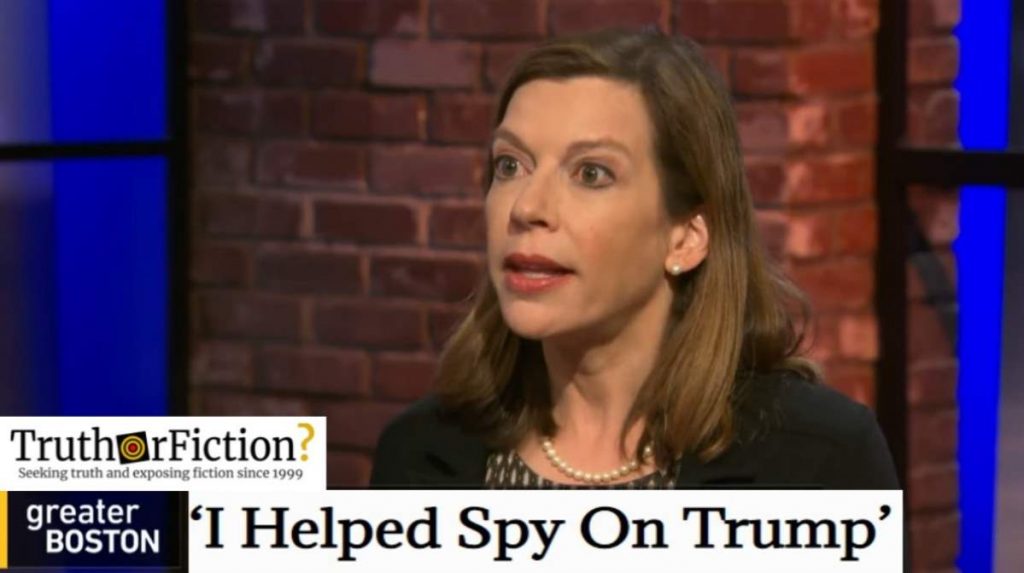Like any number of right-wing conspiracy theories, history is showing that the ginned-up panic around former Department of Defense official Evelyn Farkas was much ado over nothing much at all, even as a real-life drama was playing out under the public’s radar.
Farkas, who monitored Russia and Ukraine as the Deputy Assistant Secretary of Defense during United States President Barack Obama’s administration, was targeted with accusations that she “spied” on Obama’s successor, Donald Trump, becoming the public face of a story that was first reported by the New York Times in March 2017.
According to the newspaper, officials within Obama’s administration sought to preserve information relating to the Trump campaign’s possible meetings to Russian operatives in an effort to “leave a clear trail of intelligence for government investigators”:
In one instance, the State Department sent a cache of documents marked “secret” to Senator Benjamin Cardin of Maryland days before the Jan. 20 inauguration. The documents, detailing Russian efforts to intervene in elections worldwide, were sent in response to a request from Mr. Cardin, the top Democrat on the Foreign Relations Committee, and were shared with Republicans on the panel.
“This situation was serious, as is evident by President Obama’s call for a review — and as is evident by the United States response,” said Eric Schultz, a spokesman for Mr. Obama. “When the intelligence community does that type of comprehensive review, it is standard practice that a significant amount of information would be compiled and documented.”
After the story was published, Farkas (who stopped working for Obama’s administration in 2015) told MSNBC host Mika Brzezinski that she urged her former colleagues to continue gathering as much evidence as possible before Trump took office in January 2016. She said:
I had a fear that somehow that information would disappear with the senior people who left. So it would be hidden away in the bureaucracy that the Trump folks — if they found out how we knew what we knew about the Trump staff, dealing with Russians — that they would try to compromise those sources and methods, meaning we would no longer have access to that intelligence.
So I became very worried because not enough was coming out into the open and I knew that there was more. We have very good intelligence on Russia.
Despite not working for the White House during the time period mentioned in the story, right-wing blogs and their enablers on social media predictably spun Farkas’ remarks as her saying she “helped spy on Trump”:

As Slate reported, Trump’s first White House Press Secretary, Sean Spicer, indulged the conspiracy theory:
If you look at Obama’s Deputy Assistant Secretary of Defense that is out there, Evelyn Farkas, she made it clear that it was their goal to spread this information around, that they went around and did this. They have admitted on the record that this was their goal—to leak stuff. And they literally – she said on the record ‘Trump’s team.’ There are serious questions out there about what happened and why and who did it.
As the manufactured controversy continued, then-House Intelligence Chair Rep. Devin Nunes (R-California) claimed, without evidence, to have seen reports showing that Trump and his transition team (of which Nunes was a part) were “monitored.”
“It looks to me like it was all legally collected,” he added. “But it was essentially a lot of information on the president-elect and his transition team and what they were doing.”
Trump’s allegation that he was the victim of surveillance by the “Deep State” carried on well beyond his one-term presidency. However, an investigation by special prosecutor John Durham sputtered to an end in October 2022. As Associated Press reported at the time:
The year ended with just one criminal case — a guilty plea by an FBI lawyer who admitted doctoring an internal email related to the surveillance of a former Trump campaign adviser. Kevin Clinesmith was sentenced to probation, rather than prison. Notably, the case involved conduct uncovered in an earlier investigation by the inspector general, rather than by Durham’s team.
Two other criminal cases, also narrow in nature, faltered. After deliberating for just a few hours, a jury in May acquitted Michael Sussmann, a lawyer for Hillary Clinton’s 2016 presidential campaign. He had been accused of lying to the FBI during a meeting in which he presented the bureau’s top lawyer with information about Trump he thought should be investigated.
In January 2023, however, the links between Trump and Russian operatives played into another actual, real-life story — the indictment of Charles McGonigal, a former head of counterintelligence for the FBI’s New York office.
As Business Insider reported, in 2016 McGonigal was “one of the first officials to learn that a Trump campaign official had bragged that the Russians had dirt on Hillary Clinton.”
According to the U.S. Justice Department, after retiring from the FBI in 2018, McGonigal worked to have sanctions against Russian oligarch Oleg Deripaska lifted:
McGonigal is a former Special Agent in Charge (SAC) of FBI’s Counterintelligence Division in New York who retired in 2018. While working at the FBI, McGonigal supervised and participated in investigations of Russian oligarchs, including Deripaska. Sergey Shestakov is a former Soviet and Russian diplomat who later became a U.S. citizen and a Russian interpreter for courts and government offices.
In 2021, McGonigal and Shestakov conspired to provide services to Deripaska, in violation of U.S. sanctions imposed on Deripaska in 2018. Specifically, following their negotiations with an agent of Deripaska, McGonigal and Shestakov agreed to and did investigate a rival Russian oligarch in return for concealed payments from Deripaska. As part of their negotiations with Deripaska’s agent, McGonigal, Shestakov and the agent attempted to conceal Deripaska’s involvement by, among other means, not directly naming Deripaska in electronic communications, using shell companies as counterparties in the contract that outlined the services to be performed, using a forged signature on that contract and using the same shell companies to send and receive payment from Deripaska.
McGonigal and Shestakov were aware that their actions violated U.S. sanctions because, among other reasons, while serving as SAC, McGonigal received then-classified information that Deripaska would be added to a list of oligarchs considered for sanctions as part of the process that led to the imposition of sanctions against Deripaska.
For years beforehand, Deripaska had been a business associate of Trump’s 2016 campaign chair, Paul Manafort. Manafort was convicted of fraud in 2018, only to be pardoned by Trump in 2020.
The U.S. charged Deripaska in September 2022 with violating the financial sanctions against him.
Update 1/23/2023, 3:53 p.m. PST: This article has been revamped and updated. You can review the original here. — ag
- Obama Administration Rushed to Preserve Intelligence of Russian Election Hacking
- Democratic Senator Calls for Trump's Tax Returns
- Who the Hell Is Evelyn Farkas?
- Nunes Claims Some Trump Transition Messages Were Intercepted
- Here's Why Trump Once Again is Claiming 'spying' by Democrats
- US: Ex-FBI Counterintelligence Agent Aided Russian Oligarch
- Exclusive: Former Top FBI Oficial Involved in Trump-Russia Investigation Under Scrutiny by Federal Prosecutors for His Own Ties to Russia
- U.S. Charges Russian Billionaire Oleg Deripaska with Violating Sanctions
- Former Special Agent in Charge of the FBI New York Counterintelligence Division Charged with Violating U.S. Sanctions on Russia

